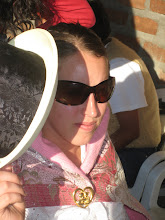I’ve never been a really patriotic person. That fact that I have lived exactly half of my life governed by presidents named George Bush probably explains that. As a Peace Corps Volunteer, one might expect that I joined to serve my country, a country I was proud to serve. Well, I did not. If anything I had reservations about joining because I did not like the direct links between the Peace Corps and the U.S. political establishment.
What amazes me is just how quickly my sentiments changed. Hearing Barack Obama accept the U.S. presidential nomination brought tears to my eyes, not necessarily because he is a skilled orator, but because of the vast implications of the election. For the first time, maybe in my life, I am actually proud to be from the U.S.A.
Given the wide-reaching implications of U.S. government actions, the election was also very important for many Peruvians. I’m fairly certain that ALL Peruvians who were aware of the election were ardent Obama supporters. Even the Peruvian shamans publically declared their support for the candidate. The day after election night, the largest newspaper in the country, El Comercio, even published an entire special section on the election, which shows just how important it was. I’m quite certain the last election of a Peruvian president did not receive its own section in the New York Times. Honestly, it is a relief that Obama won because I cannot imagine attempting to justify the election of a candidate such as Sarah Palin. Explaining why Bush won two times has been hard enough.
What really impressed me about Obama’s acceptance speech was that he, at one point, emphasized that the work that lies ahead is not his own personal burden. Each and every U.S. citizen is also responsible for participating in the sustainable development of the country. And participation is key. If anything, a President should serve to motivate the people and I hope that he succeeds in creating the movement he aspires to create. We should learn from the problems we are facing and take a proactive approach to solving them, rather than relying solely on the government to fix them. That goes for inequality, health care, environmental issues, etc. Most importantly, we must acknowledge that we are privileged and we must realize that that privilege gives us both the ability and the obligation to work towards a more just society.
--------
I went to a birthday party on All Saints Day for a man who was turning 118 years old. His son, the oldest man in Huaca Rivera at the age of 92, was celebrating along with the rest of the family by consuming intoxicating amounts of beer and chicha. Apparently, it didn’t matter that his father died at the age of 26 and had been dead for 92 years.
While there I heard one visiting woman from Chiclayo whisper to her mother, La Gorda, that she was surprised that I could tolerate the chicha. Her mother leaned over and explained to her that I have a high tolerance because in the States we all drink whiskey.
I also taught everyone at the party to say "shit". It was kind of unintentional. Basically, they kept apologizing when they said something they thought was offensive so I told them that we also swear in English. That quickly led to me translating mierda into English which spawned lingering choruses of “shit!shit!” around the table.
Friday, November 7, 2008
Subscribe to:
Post Comments (Atom)

3 comments:
Chile was all over this election too.
Um, I am totally going to quote you on this line: "privilege gives us both the ability and the obligation to work towards a more just society."
PS: I miss you!
Ah, Karen. I always knew that you would bring your notorious potty mouth to new societies.
Post a Comment